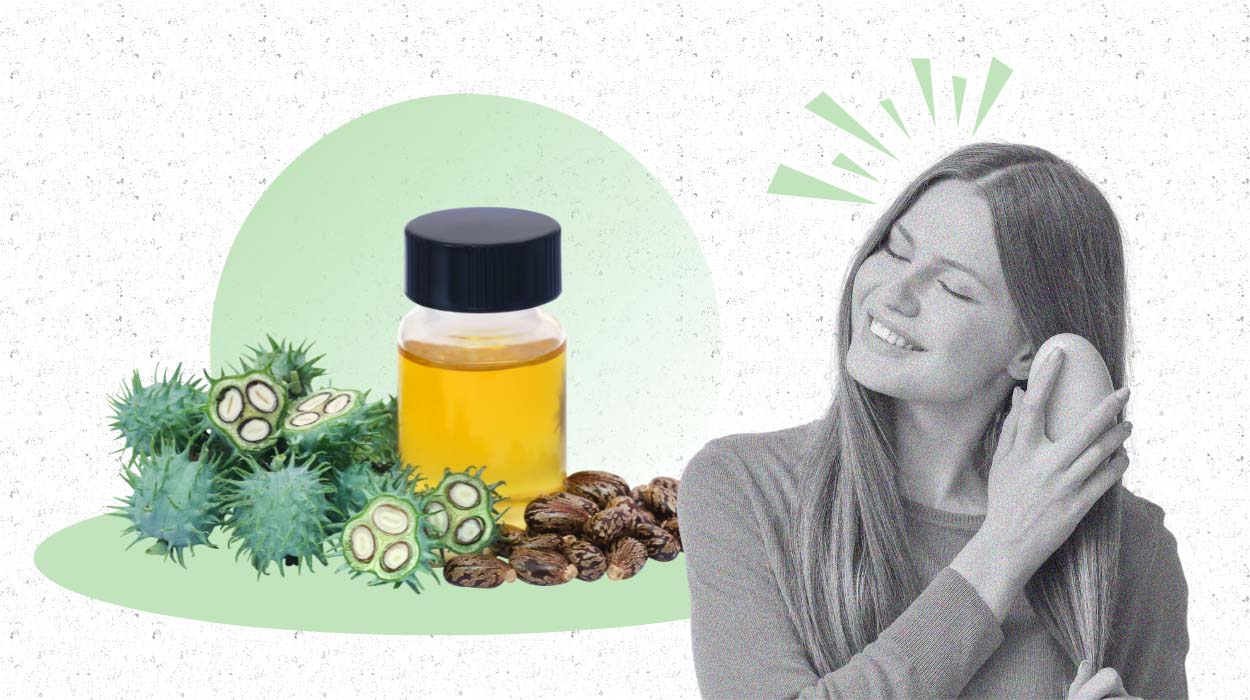Castor Oil For Hair Growth: Benefits, Uses & Side Effects In 2024

Castor oil is a vegetable oil derived from the castor oil plant (Ricinus communis L.)[1]. Mainly grown in India, China, and Brazil, India accounts for over 90% of all global castor oil exports, with the majority produced in Gujarat, Western India. Because of castor oil’s high viscosity, its solubility for pigments, and its properties as a skin conditioning agent, it remains a staple of many cosmetic products[2] (e.g., sunscreen, soap, lip balm), some pharmaceuticals, and even serves as a basis for biofuel!
In this article, we’ll specifically be investigating the use of castor oil for hair growth. We’ll share current scientific insights into the efficacy of the approach and castor oil for hair side effects. You’ll also find some general hair-care tips, such as why superfoods can help boost the health and luster of your hair and how collagen might also give your lustrous mane an even greater shine.
Key Takeaway
- Castor oil does grow your hair and can help you fight hair loss.
- This castor oil is derived from the Ricinus communis plant, part of the Eurphorbiaceae family
- If you’ve never used castor oil before. In that case, you should use a patch test 24-48 hours beforehand to avoid an allergic reaction.
- How to use castor oil for hair: add castor oil (a few drops only) to your favorite conditioner or hair mask.
- Castor oil may not be beneficial for everyone as a hair growth aid.
- Some tips for healthy hair.
Castor Oil For Hair Growth: Is It Good?

So is castor oil a worthwhile ingredient to add to your hair care portfolio? The answer is yes! Castor oil does grow your hair.
Castor oil has been a favored medicinal choice for millions of people over thousands of years. Until recently, however, evidence of its efficacy remained anecdotal. Happily, some animal studies are now emerging to support the use of castor oil in obtaining thicker and longer hair mass.
This article will explore how ricinoleic acid, present in castor oil, can protect[3] your hair and scalp. We’ll also be taking a look at how castor oil stimulates prostaglandin[4] (fatty acids) to aid hair quality. We’ll be exploring how the ricinoleic acid and triglycerides in castor oil together function as powerful antimicrobial and antifungal agents[5] to improve the health of your skin, scalp, and hair.
What Is Castor Oil?
Castor oil is derived from the Ricinus communis plant, part of the Eurphorbiaceae family. Considered to hold medicinal qualities, Ricinus communis has been cultivated for thousands of years and traded for just as long a period.
Harvested from the plant’s seed, castor oil is often utilized as a treatment for yeast infections, constipation, acne, general immunity, arthritis, and varicose veins. However, its predominant use remains to be a treatment for hair growth and shine.
India, China, and Brazil account for a whopping 93% of the world’s castor oil production! As a 5,000-year-old ritual based on the Indian science of Ayurvedic medicine, hair oiling is considered amongst Indians not only to be a beauty-related ritual, but a sacred cultural one, too. So let’s take a look at some of the leading benefits of this most ancient of Eastern traditions.
Benefits Of Castor Oil For Hair
Did you know that there are around 100,000 hair follicles on your head at any given time? Of these 100,000 follicles, around 90% are perpetually in the anagen, or growth, phase. And it is this phase that castor oil is thought principally to benefit.
Castor oil for hair growth works by stimulating the prostaglandin E2 receptor,[4] improving the flow of nutrients and oxygen to your scalp and hair follicles, and encouraging hair regrowth. This takes place during the anagen, thereby encouraging healthier hair growth. Furthermore, the triglycerides in castor oil function as an emollient, helping to retain moisture in the hair and giving it a smooth texture.
Castor oil also contributes to hair growth due to its high (omega-9) long-chained fatty acid concentration, viscosity, and humectant qualities. A high ricinoleic acid[6] quotient found in castor oil increases blood flow to the scalp while increasing the proportion of developing hair follicles during this growth phase. This process also has been observed to provide therapeutic effects (i.e., improvement of overall hair quality alongside moisturizing properties).
Fights Hair Loss
Scientific evidence shows that applying castor oil can also offer some benefits in fighting a form of hair loss known as androgenetic alopecia.[6] As the ricinoleic acid in castor oil penetrates the skin, it works to inhibit a form of prostaglandin known as prostaglandin D2 synthase, which plays a role in the onset of alopecia. Subsequently, it helps to prevent further loss of hair.
Interestingly, polyoxyethylene hydrogenated castor oil has also been observed to play a meaningful role in improving the efficacy of[7] polyphenol-based skin cancer treatments.
Overall, empirical research[8] reflects castor oil as a safe and tolerable ingredient, providing some analgesic, antioxidant, wound healing, anti‐microbial, and anti‐inflammatory properties and promoting hair growth. It also acts effectively as an emollient (i.e., as a softening, smoothing agent).
How To Use Castor Oil On Hair

So, how exactly should you apply castor oil to stimulate and encourage hair growth of hair on the scalp (and even eyebrows)?
First, if you’ve never used castor oil before. In that case, you should use a patch test 24-48 hours beforehand to avoid an allergic reaction, as allergic contact dermatitis,[9] while rare, has been observed in a small percentage of the population.
The Right Castor Oil For Your Hair
Second, which castor oil is best for hair growth? In truth, all hair types can benefit from the emollient qualities of castor oil. We’d recommend that you choose a cold-pressed castor oil (for stimulating hair growth of the hair shaft and avoiding the feeling of oily hair) if your hair is finer. For hair growth and silkening, Jamaican black castor oil (richer and more viscous) is a better choice for thicker and heavier hair.
Once you’ve chosen which castor oil works best for you, add castor oil (a few drops only) to your favorite conditioner. Alternatively, to stimulate hair follicles, cover only the ends of your hair with castor oil, leaving it on for a few minutes to achieve a deep, conditioning effect.
Castor Oil Hair Masks
Looking for a more powerful smoothening effect for damaged hair? Wrap a towel or shower cap around your hair and let it work overnight. Upon waking, wash out the castor oil using shampoo and warm water.
When hair tends to dry out in the winter months, incorporate castor oil into your normal routine to avoid a dry scalp and maximize your hair’s health. A hair mask may be a great choice for a deeper level of conditioning that you might be looking for. Simply massage a few drops of castor oil, or a castor oil hair mask product, into your hair and scalp, ensuring full coverage from root to tip, and leave to soak in for a couple of hours before rinsing out and following your normal hair care routine.
Precautions And Castor Oil Side Effects
Is castor oil safe? While the benefits of castor oil are clear, castor oil may not be beneficial for everyone as a hair growth aid. Castor oil, alongside other commonly used hair oils (such as coconut oil, olive oil, and oleic acid), may worsen a chronic inflammatory condition known as seborrheic dermatitis,[10] which affects the scalp and face.
Castor oil has also been observed to play an occasional role in acute hair felting or matting cases. Officially known as plica polonica or plica neuropathica,[11] this spontaneous hair matting condition is largely thought to be due to castor oil’s ricinoleic status as a monounsaturated fatty acid and because of its moisturizing, humectant qualities. While these properties are often beneficial, its status as a ricinoleic can also make it volatile, sticky, viscous, and a risk for spontaneous matting.
Tips For Healthy Hair

Alongside using hair oils like castor oil, here are our top tips for healthy hair!
- Make sure you eat the right nutrients! Minerals, vitamins, and proteins are essential[12] to the anagen phase of hair growth and are subsequently considered vital in maintaining healthy hair. Unfortunately, research shows that mineral and vitamin deficiency prevalence is markedly high amongst the general population, affecting around 2 billion people globally.[13] As hair follicle production relies on an adequate intake of trace elements (like iron and zinc) and vitamins for an effective biosynthetic activity to occur, choosing a diet high in nutrients and superfoods will allow you to maximize hair quality and thickness. This high-nutrient diet, alongside avoiding poor sleep[14] and other negative side effects of nutrient deficiency, should ultimately result in thicker, shinier hair.
- De-stress! Leading a less stressful life is easier said than done, but it’s still worth knowing that elevated levels of the stress hormone cortisol[15] have been directly linked to hair loss.
- Take a break from hair straighteners. This beautification process might make you feel like a million bucks in the short term. Still, in the longer term, you risk negatively affecting the chemical structure of keratin[16] and of the hair fiber itself, which can lead to breakage and hair loss.
- Take a multi-layered approach to hair growth. Recent research tells us that hair health can be affected by a whole range of factors,[8] including genetics, andropause, menopause (hormonal changes that occur in our bodies as we age), and our exposure to chemicals. If hair loss concerns you, visit your doctor, board-certified dermatologist, or trichologist (hair specialist) for further advice and guidance.
- Invest in collagen for age-related hair loss. A recent study of oral collagen supplementation reflected a range of benefits, including less hair loss and hair breakage originally caused by aging. Look for collagen as an active ingredient in your shampoo and conditioner, or invest in oral collagen-based edibles such as collagen gummies or collagen protein powder if you hope to increase hair growth.
Conclusion
A booming, profitable hair care industry, and the sacred role that hair oiling continues to play in Ayurvedic medicine, reflect the critical role that hair has always played in our collective self-identity.[17] Egyptian hieroglyphics reflect the centrality of hair in ancient Egyptian civilization, largely as a form of beauty and erotic symbolism.
In contrast, ancient Romans regarded it as a potent symbol of beauty, class, intellect, and masculinity. Such appreciation persists across virtually all cultures in the present day. As a result, it comes as little surprise that we continue to invest heavily in hair products and supplements for cultural, social, and beauty-related reasons.
Ultimately, relying on Food and Drug Administration-approved products and those that exhibit scientifically verifiable benefits will maximize the results that we experience from our hair care routine, offering us a winning strategy that we can always rely on.
+ 21 sources
Health Canal avoids using tertiary references. We have strict sourcing guidelines and rely on peer-reviewed studies, academic researches from medical associations and institutions. To ensure the accuracy of articles in Health Canal, you can read more about the editorial process here
- Dumancas, G.G. (2016). Castor Oil: Properties, Uses, and Optimization of Processing Parameters in Commercial Production – Vinay R. Patel, Gerard G. Dumancas, Lakshmi C. Kasi Viswanath, Randall Maples, Bryan John J. Subong, 2016. [online] Lipid Insights. Available at: https://journals.sagepub.com/doi/full/10.4137/LPI.S40233#bibr1-LPI-S40233
- Verheyden, M., Rombouts, S., Lambert, J. and Aerts, O. (2017). Contact Allergy to Castor Oil, but Not to Castor Wax. Cosmetics, [online] 4(1), p.5. doi:https://doi.org/10.3390/cosmetics4010005.
- Elisée Kouassi KPOROU, Sitapha OUATTARA, Moussa GBOGBO, Yabo Parfait GOUEDJI, Koffi, A. and Allico Joseph DJAMAN (2021). Quality, safety and activity of an ointment formulated from two vegetable oils on rabbits hair growth. Pharmacopée et médecine traditionnelle africaine, [online] 20(0), pp.38–46. Available at: http://publication.lecames.org/index.php/pharm/article/view/2388
- Subramaniyan, V. (2020). Therapeutic Importance of Caster Seed Oil. Nuts and Seeds in Health and Disease Prevention, [online] pp.485–495. doi:https://doi.org/10.1016/b978-0-12-818553-7.00034-6.
- Cheng, H., Liu, F., Zhou, M., Chen, S., Huang, H., Liu, Y., Zhao, X., Zhang, Q., Zhou, X., Li, Z. and Cai, H. (2022). Enhancement of hair growth through stimulation of hair follicle stem cells by prostaglandin E2 collagen matrix. Experimental Cell Research, [online] 421(2), p.113411. doi:https://doi.org/10.1016/j.yexcr.2022.113411.
- Goyal, A., Sharma, A., Kaur, J., Kumari, S., Garg, M., Sindhu, R.K., Rahman, Md.H., Akhtar, M.F., Tagde, P., Najda, A., Banach-Albińska, B., Masternak, K., Alanazi, I.S., Mohamed, H.R.H., El-kott, A.F., Shah, M., Germoush, M.O., Al-malky, H.S., Abukhuwayjah, S.H. and Altyar, A.E. (2022). Bioactive-Based Cosmeceuticals: An Update on Emerging Trends. Molecules, [online] 27(3), p.828. doi:https://doi.org/10.3390/molecules27030828.
- Sharma, A., Rathod, S., Rai, A. and Parab, S. (2022). A Magic Remedy of Castor Oil. International Journal of Pharmaceutical Research and Applications, [online] 7, p.775. doi:https://doi.org/10.35629/7781-0703775782.
- Fong, P., Tong, H.H.Y., Ng, K.H., Lao, C.K., Chong, C.I. and Chao, C.M. (2015). In silico prediction of prostaglandin D2 synthase inhibitors from herbal constituents for the treatment of hair loss. Journal of Ethnopharmacology, [online] 175, pp.470–480. doi:https://doi.org/10.1016/j.jep.2015.10.005.
- Sharma, P., Montes de Oca, M.K., Alkeswani, A.R., McClees, S.F., Das, T., Elmets, C.A. and Afaq, F. (2017). Tea polyphenols for the prevention of UVB-induced skin cancer. Photodermatology, Photoimmunology & Photomedicine, [online] 34(1), pp.50–59. doi:https://doi.org/10.1111/phpp.12356.
- Kesika, P., Sivamaruthi, B.S., Thangaleela, S., Bharathi, M. and Chaiyasut, C. (2023). Role and Mechanisms of Phytochemicals in Hair Growth and Health. Pharmaceuticals, [online] 16(2), p.206. doi:https://doi.org/10.3390/ph16020206.
- Dermatitis. (2021). Contact Allergens in Hair Care Products Formulated for Textured Hair | Dermatitis. [online] Available at: https://www.liebertpub.com/doi/abs/10.1097/DER.0000000000000866?journalCode=der
- Mayo, T., Dinkins, J. and Elewski, B. (2023). Hair Oils May Worsen Seborrheic Dermatitis in Black Patients. Skin Appendage Disorders, [online] 9(2), pp.151–152. doi:https://doi.org/10.1159/000527778.
- Maduri, Vr., Vedachalam, A. and Kiruthika, S. (2017). ‘Castor Oil’ – The culprit of acute hair felting. International Journal of Trichology, [online] 9(3), p.116. doi:https://doi.org/10.4103/ijt.ijt_22_17.
- Almohanna, H.M., Ahmed, A.A., Tsatalis, J.P. and Tosti, A. (2018). The Role of Vitamins and Minerals in Hair Loss: A Review. Dermatology and Therapy, [online] 9(1), pp.51–70. doi:https://doi.org/10.1007/s13555-018-0278-6.
- Sivaprasad, M., Shalini, T., Reddy, P.Y., Seshacharyulu, M., Madhavi, G., Kumar, B.N. and Reddy, G.B. (2019). Prevalence of vitamin deficiencies in an apparently healthy urban adult population: Assessed by subclinical status and dietary intakes. Nutrition, [online] 63-64, pp.106–113. doi:https://doi.org/10.1016/j.nut.2019.01.017.
- Proquest.com. (2014). Diffüz saç dökülmeleri; besinsel eksikler ve destekler/Diffuse alopecia; nutritional factors and supplements – ProQuest. [online] Available at: https://www.proquest.com/openview/fff96b2a226c23900c88b08a1d588ce6/1?pq-origsite=gscholar&cbl=55021
- Djokic, G., Vojvodic, P., Korcok, D., Agic, A., Rankovic, A., Djordjevic, V., Vojvodic, A., Vlaskovic-Jovicevic, T., Peric-Hajzler, Z., Vojvodic, J., Matovic, D., Sijan, G., Wollina, U., Tirant, M., Nguyen, V.T., Fioranelli, M. and Lotti, T. (2019). The Effects of Magnesium – Melatonin – Vit B Complex Supplementation in Treatment of Insomnia. Open Access Macedonian Journal of Medical Sciences, [online] 7(18), pp.3101–3105. doi:https://doi.org/10.3889/oamjms.2019.771.
- Europe PMC (2016). Europe PMC. [online] Europepmc.org. Available at: https://europepmc.org/article/med/27538002
- Miranda-Vilela, A.L., Botelho, A.J. and Muehlmann, L.A. (2013). An overview of chemical straightening of human hair: technical aspects, potential risks to hair fibre and health and legal issues. International Journal of Cosmetic Science, [online] 36(1), pp.2–11. doi:https://doi.org/10.1111/ics.12093.
- Monselise, A., Cohen, D.E., Wanser, R. and Shapiro, J. (2017). What Ages Hair? International Journal of Women’s Dermatology, [online] 3(1), pp.S52–S57. doi:https://doi.org/10.1016/j.ijwd.2017.02.010.
- Das, P., Pn, K., Cd, S., Kumar, N. and Saraswathi (2021). Formulation and evaluation of poly herbal hair oil. ~ 98 ~ National Journal of Pharmaceutical Sciences, [online] 1(2), pp.98–100. Available at: https://www.pharmajournal.net/article/25/1-2-15-868.pdf.



